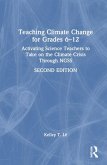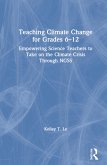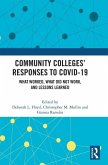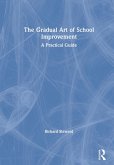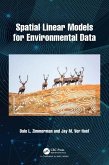Non-Linear Perspectives on Teacher Development
Complexity in Professional Learning and Practice
Herausgeber: Strom, Kathryn J; Abrams, Linda; Mills, Tammy
Non-Linear Perspectives on Teacher Development
Complexity in Professional Learning and Practice
Herausgeber: Strom, Kathryn J; Abrams, Linda; Mills, Tammy
- Gebundenes Buch
- Merkliste
- Auf die Merkliste
- Bewerten Bewerten
- Teilen
- Produkt teilen
- Produkterinnerung
- Produkterinnerung
Despite multifaceted complexity of teaching, dominant perspectives conceptualize teacher development in linear, dualistic, transactional, human-centric ways. The book offers non-linear alternatives by drawing on perspectives like CHAT, complexity theory, actor network theory, indigenous studies, rhizomatics, posthuman/neomaterialisms.
Andere Kunden interessierten sich auch für
![Teaching Climate Change for Grades 6-12 Teaching Climate Change for Grades 6-12]() Kelley T LêTeaching Climate Change for Grades 6-12202,99 €
Kelley T LêTeaching Climate Change for Grades 6-12202,99 €![Teaching Climate Change for Grades 6-12 Teaching Climate Change for Grades 6-12]() Kelley T LêTeaching Climate Change for Grades 6-12158,99 €
Kelley T LêTeaching Climate Change for Grades 6-12158,99 €![Community Colleges' Responses to COVID-19 Community Colleges' Responses to COVID-19]() Community Colleges' Responses to COVID-19206,99 €
Community Colleges' Responses to COVID-19206,99 €![The Gradual Art of School Improvement The Gradual Art of School Improvement]() Richard StewardThe Gradual Art of School Improvement183,99 €
Richard StewardThe Gradual Art of School Improvement183,99 €![Spatial Linear Models for Environmental Data Spatial Linear Models for Environmental Data]() Dale L ZimmermanSpatial Linear Models for Environmental Data115,99 €
Dale L ZimmermanSpatial Linear Models for Environmental Data115,99 €![Apocalypse Never Apocalypse Never]() Michael ShellenbergerApocalypse Never20,99 €
Michael ShellenbergerApocalypse Never20,99 €![Un Millennium Development Library: Environment and Human Well-Being Un Millennium Development Library: Environment and Human Well-Being]() Un Millennium ProjectUn Millennium Development Library: Environment and Human Well-Being168,99 €
Un Millennium ProjectUn Millennium Development Library: Environment and Human Well-Being168,99 €-
-
-
Despite multifaceted complexity of teaching, dominant perspectives conceptualize teacher development in linear, dualistic, transactional, human-centric ways. The book offers non-linear alternatives by drawing on perspectives like CHAT, complexity theory, actor network theory, indigenous studies, rhizomatics, posthuman/neomaterialisms.
Hinweis: Dieser Artikel kann nur an eine deutsche Lieferadresse ausgeliefert werden.
Hinweis: Dieser Artikel kann nur an eine deutsche Lieferadresse ausgeliefert werden.
Produktdetails
- Produktdetails
- Verlag: Taylor & Francis
- Seitenzahl: 372
- Erscheinungstermin: 21. März 2023
- Englisch
- Abmessung: 244mm x 170mm x 22mm
- Gewicht: 812g
- ISBN-13: 9781032444208
- ISBN-10: 1032444207
- Artikelnr.: 66712732
- Herstellerkennzeichnung
- Libri GmbH
- Europaallee 1
- 36244 Bad Hersfeld
- gpsr@libri.de
- Verlag: Taylor & Francis
- Seitenzahl: 372
- Erscheinungstermin: 21. März 2023
- Englisch
- Abmessung: 244mm x 170mm x 22mm
- Gewicht: 812g
- ISBN-13: 9781032444208
- ISBN-10: 1032444207
- Artikelnr.: 66712732
- Herstellerkennzeichnung
- Libri GmbH
- Europaallee 1
- 36244 Bad Hersfeld
- gpsr@libri.de
Kathryn J. Strom is Associate Professor of Educational Leadership at California State University, East Bay, USA. She employs critical, complex theories to study teacher and leadership development, as well as advocate for different ways of thinking in education more broadly, with broad goals of disrupting inequities for minoritized populations. Tammy Mills, Assistant Professor at the University of Maine, USA, draws from complex theories and self-study methodologies to study situated teacher learning broadly and help both preservice and practicing teachers understand the interaction among their geopolitical locations, socio-ethical imperatives, and the dynamic development of their teacher identities. Linda Abrams, Lecturer at New Jersey City University, USA, is a retired teacher and administrator with over three decades of experience in K-12 education systems. Her expertise lies at the intersections of complex, relational theories and mentoring knowledge and practice.
1. Introduction: Illuminating a continuum of complex perspectives in
teacher development 2. Towards a complex framework of teacher
learning-practice 3. Supporting expansive learning in preservice bilingual
teachers' zone of proximal development of the activity system: an analysis
of a four-field model trajectory 4. 'The ability to lay yourself bare':
centering rupture, inherited conversations, and vulnerability in
professional development 5. Exploring cultural logic in becoming teacher: a
collaborative autoethnography on transnational teaching and learning 6.
Embracing complex adaptive practice: the potential of lesson study 7. A
complex dynamic systems approach to the design and evaluation of teacher
professional development 8. Mobilising new understandings: an actor-network
analysis of learning and change in a self-directed professional development
community 9. Exploring the role of curriculum materials in teacher
professional development 10. 'Crossing the bridge': land education teacher
professional development 11. Unravelling effective professional
development: a rhizomatic inquiry into coaching and the active ingredients
of teacher learning 12. Exploring student teachers' 'stuck moments':
affect[ing] the theory-practice gap in social justice teacher education
13. Being before: three Deleuzian becomings in teacher education 14. 'It's
all there.': Entanglements of teacher preparation and induction 15.
Diffraction as an otherwise practice of exploring new teachers'
entanglements in time and space 16. Aesthetic-ethical-political movements
in professional learning: encounters with feminist new materialisms and
Reggio Emilia in early childhood research 17. 2-Curious: jarring
representations of the two-year-old in transformative continuous
professional development (CPD) 18. Teacher subjectivities and
multiplicities of enactment: Agential realism and the case of science
teacher learning and practice with multilingual Latinx students 19.
Entanglement, evaluation and practice in a professional learning innovation
20. What does making produce? Posthuman insights into documenting
relationalities in maker education for teachers 21. 'I don't want them to
feel like we're part of the establishment': teachers' learning to work with
refugee families as entangled becomings 22. Reconceptualizing teacher
professional learning about technology integration as intra-active
entanglements 23. What if?: becoming response-able with the making and
mattering of a new relationships and sexuality education curriculum
teacher development 2. Towards a complex framework of teacher
learning-practice 3. Supporting expansive learning in preservice bilingual
teachers' zone of proximal development of the activity system: an analysis
of a four-field model trajectory 4. 'The ability to lay yourself bare':
centering rupture, inherited conversations, and vulnerability in
professional development 5. Exploring cultural logic in becoming teacher: a
collaborative autoethnography on transnational teaching and learning 6.
Embracing complex adaptive practice: the potential of lesson study 7. A
complex dynamic systems approach to the design and evaluation of teacher
professional development 8. Mobilising new understandings: an actor-network
analysis of learning and change in a self-directed professional development
community 9. Exploring the role of curriculum materials in teacher
professional development 10. 'Crossing the bridge': land education teacher
professional development 11. Unravelling effective professional
development: a rhizomatic inquiry into coaching and the active ingredients
of teacher learning 12. Exploring student teachers' 'stuck moments':
affect[ing] the theory-practice gap in social justice teacher education
13. Being before: three Deleuzian becomings in teacher education 14. 'It's
all there.': Entanglements of teacher preparation and induction 15.
Diffraction as an otherwise practice of exploring new teachers'
entanglements in time and space 16. Aesthetic-ethical-political movements
in professional learning: encounters with feminist new materialisms and
Reggio Emilia in early childhood research 17. 2-Curious: jarring
representations of the two-year-old in transformative continuous
professional development (CPD) 18. Teacher subjectivities and
multiplicities of enactment: Agential realism and the case of science
teacher learning and practice with multilingual Latinx students 19.
Entanglement, evaluation and practice in a professional learning innovation
20. What does making produce? Posthuman insights into documenting
relationalities in maker education for teachers 21. 'I don't want them to
feel like we're part of the establishment': teachers' learning to work with
refugee families as entangled becomings 22. Reconceptualizing teacher
professional learning about technology integration as intra-active
entanglements 23. What if?: becoming response-able with the making and
mattering of a new relationships and sexuality education curriculum
1. Introduction: Illuminating a continuum of complex perspectives in
teacher development 2. Towards a complex framework of teacher
learning-practice 3. Supporting expansive learning in preservice bilingual
teachers' zone of proximal development of the activity system: an analysis
of a four-field model trajectory 4. 'The ability to lay yourself bare':
centering rupture, inherited conversations, and vulnerability in
professional development 5. Exploring cultural logic in becoming teacher: a
collaborative autoethnography on transnational teaching and learning 6.
Embracing complex adaptive practice: the potential of lesson study 7. A
complex dynamic systems approach to the design and evaluation of teacher
professional development 8. Mobilising new understandings: an actor-network
analysis of learning and change in a self-directed professional development
community 9. Exploring the role of curriculum materials in teacher
professional development 10. 'Crossing the bridge': land education teacher
professional development 11. Unravelling effective professional
development: a rhizomatic inquiry into coaching and the active ingredients
of teacher learning 12. Exploring student teachers' 'stuck moments':
affect[ing] the theory-practice gap in social justice teacher education
13. Being before: three Deleuzian becomings in teacher education 14. 'It's
all there.': Entanglements of teacher preparation and induction 15.
Diffraction as an otherwise practice of exploring new teachers'
entanglements in time and space 16. Aesthetic-ethical-political movements
in professional learning: encounters with feminist new materialisms and
Reggio Emilia in early childhood research 17. 2-Curious: jarring
representations of the two-year-old in transformative continuous
professional development (CPD) 18. Teacher subjectivities and
multiplicities of enactment: Agential realism and the case of science
teacher learning and practice with multilingual Latinx students 19.
Entanglement, evaluation and practice in a professional learning innovation
20. What does making produce? Posthuman insights into documenting
relationalities in maker education for teachers 21. 'I don't want them to
feel like we're part of the establishment': teachers' learning to work with
refugee families as entangled becomings 22. Reconceptualizing teacher
professional learning about technology integration as intra-active
entanglements 23. What if?: becoming response-able with the making and
mattering of a new relationships and sexuality education curriculum
teacher development 2. Towards a complex framework of teacher
learning-practice 3. Supporting expansive learning in preservice bilingual
teachers' zone of proximal development of the activity system: an analysis
of a four-field model trajectory 4. 'The ability to lay yourself bare':
centering rupture, inherited conversations, and vulnerability in
professional development 5. Exploring cultural logic in becoming teacher: a
collaborative autoethnography on transnational teaching and learning 6.
Embracing complex adaptive practice: the potential of lesson study 7. A
complex dynamic systems approach to the design and evaluation of teacher
professional development 8. Mobilising new understandings: an actor-network
analysis of learning and change in a self-directed professional development
community 9. Exploring the role of curriculum materials in teacher
professional development 10. 'Crossing the bridge': land education teacher
professional development 11. Unravelling effective professional
development: a rhizomatic inquiry into coaching and the active ingredients
of teacher learning 12. Exploring student teachers' 'stuck moments':
affect[ing] the theory-practice gap in social justice teacher education
13. Being before: three Deleuzian becomings in teacher education 14. 'It's
all there.': Entanglements of teacher preparation and induction 15.
Diffraction as an otherwise practice of exploring new teachers'
entanglements in time and space 16. Aesthetic-ethical-political movements
in professional learning: encounters with feminist new materialisms and
Reggio Emilia in early childhood research 17. 2-Curious: jarring
representations of the two-year-old in transformative continuous
professional development (CPD) 18. Teacher subjectivities and
multiplicities of enactment: Agential realism and the case of science
teacher learning and practice with multilingual Latinx students 19.
Entanglement, evaluation and practice in a professional learning innovation
20. What does making produce? Posthuman insights into documenting
relationalities in maker education for teachers 21. 'I don't want them to
feel like we're part of the establishment': teachers' learning to work with
refugee families as entangled becomings 22. Reconceptualizing teacher
professional learning about technology integration as intra-active
entanglements 23. What if?: becoming response-able with the making and
mattering of a new relationships and sexuality education curriculum


